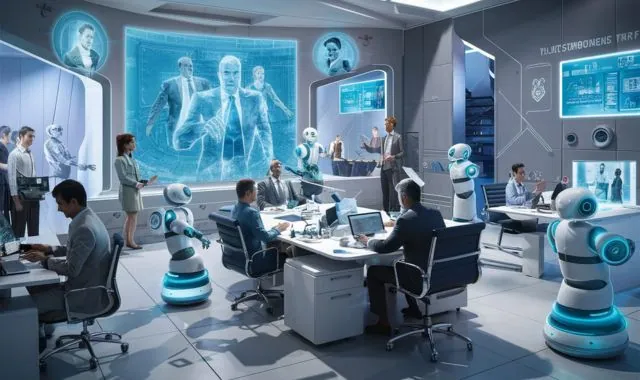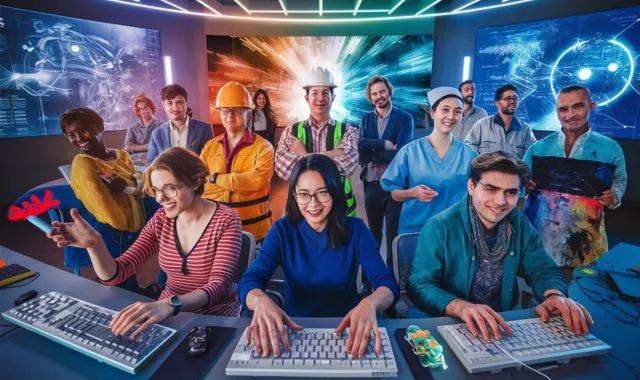Physical Address
304 North Cardinal St.
Dorchester Center, MA 02124
Physical Address
304 North Cardinal St.
Dorchester Center, MA 02124

The article explores the main concept of Emerging Technology. It defines them as rapidly developing innovations with the potential to transform our lives. From Artificial Intelligence (AI) to robotics, these technologies are impacting industries like medicine and manufacturing. The article also discusses the challenges and opportunities that come with emerging technologies, emphasizing the importance of ethical considerations and continuous learning to navigate this exciting future.

Emerging technologies are like seedlings bursting with potential. They represent innovations in their early stages of development, with the promise to revolutionize how we live, work, and interact with the world around us. Unlike established technologies that are well-understood and widely used, emerging technologies are still evolving, their full capabilities waiting to be unveiled. Imagine the clunky desktop computers of the past compared to the sleek laptops and smartphones we carry today. Emerging technologies are like those early prototypes – exciting possibilities with the potential to redefine the future.
Here are some key characteristics that define emerging technologies:
Radical Novelty: Emerging technologies aren’t just about minor upgrades. They often introduce entirely new concepts or significantly redefine existing ones. Think about the shift from traditional photography to the instant gratification of digital cameras, or the way social media platforms have transformed communication.
Breakneck Speed:The development of emerging technologies is rapid. Research and innovation move at an accelerated pace, constantly pushing the boundaries of what’s possible. This rapid development cycle means we can expect to see these technologies evolve and mature quickly.
A Tangled Web:Emerging technologies rarely exist in isolation. They often build upon or interact with each other, creating a complex web of interconnectedness. For instance, the advancements in artificial intelligence (AI) are fueling the development of the Internet of Things (IoT), where everyday objects are interconnected and communicate data. This synergy between technologies fosters further innovation and unlocks even greater possibilities.
Shaping Our World:Emerging technologies have the potential to disrupt the status quo and significantly impact various aspects of our lives. From the way we manufacture goods to how we receive medical care, these innovations can revolutionize industries and reshape our world.
The Foggy Future: One of the defining features of emerging technologies is the inherent uncertainty and ambiguity surrounding them. The long-term implications of many of these innovations are still unknown. Careful consideration and ethical discussions are crucial as we navigate the potential benefits and challenges that emerging technologies present.
The term “emerging technology” encompasses a wide range of exciting fields. Here are a few examples that are capturing the imagination of scientists and researchers:
AI refers to the development of intelligent machines capable of mimicking human cognitive functions such as learning and problem-solving. From facial recognition software to AI-powered chatbots, this technology is rapidly transforming various industries, from healthcare to customer service.
The IoT envisions a world where everyday objects, from refrigerators to thermostats, are interconnected, collecting and exchanging data. Imagine your smart speaker automatically adjusting the room temperature based on your preferences – that’s the power of the IoT!
This field focuses on the manipulation of living organisms or their components to create new products or processes. From gene editing to bioprinting human organs, biotechnology holds immense potential for revolutionizing medicine and agriculture.
Robotics involves the design, construction, and operation of robots. As robots become more sophisticated and adaptable, they’re poised to play a significant role in various sectors, from automating manufacturing processes to performing delicate surgical procedures.
Blockchain is a revolutionary distributed ledger technology that allows for secure, transparent, and tamper-proof record-keeping. This technology has the potential to transform industries like finance and supply chain management by creating a secure and trustworthy way to track and verify transactions.
These are just a few examples, and the list of emerging technologies is constantly growing. As research and development continue to accelerate, we can expect even more groundbreaking innovations to emerge in the years to come.

Emerging technologies aren’t just flashy concepts; they have real-world consequences that are already shaping our lives in profound ways. Here’s a glimpse into how these innovations are making waves across various sectors:
Emerging technologies will undoubtedly impact the job market. While some jobs might be automated, new opportunities will arise in fields like developing, maintaining, and overseeing these technologies. The key will be adapting our skillsets to remain relevant in this evolving landscape.
Emerging technologies have the potential to enhance our capabilities in various ways. Imagine using smart glasses to access information and translate languages in real-time, or prosthetic limbs controlled by brain-computer interfaces. These innovations have the potential to improve our quality of life and empower individuals with disabilities.
The rapid development of emerging technologies also raises ethical concerns. Issues like data privacy, bias in AI algorithms, and the potential for job displacement need careful consideration. Open discussions and ethical frameworks are crucial to ensure these technologies are used responsibly and for the benefit of humanity.
The future of emerging technologies is shrouded in a certain degree of mystery, but that’s part of the excitement. Here’s how we can approach this uncharted territory:
The Power of Collaboration:Fostering innovation requires collaboration between scientists, engineers, policymakers, and the public. By working together, we can ensure that emerging technologies are developed and implemented responsibly.
Continuous Learning:The rapid pace of technological change necessitates continuous learning. We all need to be adaptable and embrace lifelong learning to keep pace with the evolving landscape.

Emerging technologies are like a brushstroke on a vast canvas, painting a picture of a world vastly different from the one we know today. These innovations have the potential to revolutionize how we live, work, and interact with the world around us. While challenges exist, the potential benefits are undeniable. By embracing continuous learning, fostering collaboration, and approaching these innovations with a spirit of open-mindedness, we can ensure that emerging technologies shape a brighter future for all.
Emerging technologies will undoubtedly change the job market. Some jobs might be automated, but new opportunities will arise in areas like developing, maintaining, and overseeing these technologies. The key is to develop adaptable skillsets to stay relevant.
Embrace lifelong learning and develop skills in critical thinking, problem-solving, and creativity. These skills will be valuable in a world shaped by emerging technologies.
Data privacy, bias in AI algorithms, and the potential for job displacement are some key ethical concerns. Open discussions and ethical frameworks are crucial to ensure responsible development and use of these technologies.
Numerous online resources, scientific journals, and technology news websites provide in-depth information about emerging technologies. Universities and research institutions also offer courses and workshops on these topics.
Many universities and research institutions offer programs in science, technology, engineering, and mathematics (STEM) fields. Additionally, various companies and organizations working on emerging technologies might have internship or job opportunities.